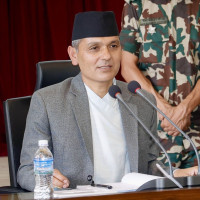- Friday, 20 February 2026
Bring Law To Promote Neobanking
Neobanking is a new concept for Nepal. A neobank is a digital-based banking system that operates without physical infrastructure and locations. It provides financial services for people digitally, such as through mobile apps and websites. The services provided by a neobank include current accounts, savings accounts, debit and credit cards, funds transfer and payment options and the like.
As compared to traditional banks, neobanks are cost-effective and customer-friendly. Neobanks can provide services where traditional banks cannot, such as in remote areas. This is because they do not require physical facilities such as buildings and operate digitally. Owing to the low cost, the services may be provided free of cost or at a lower cost. Loans can be disbursed promptly, as it takes a little time for processing and approval. Besides, neobanks provide innovative services.
Financial system
Neobanks are part of the financial system. They are characterised by easy access, ease of use, cost-effectiveness and innovative methods of providing services. They provide unbanked people with access to banking services such as debit and credit cards, savings accounts and tools for improving their financial status. With seamless and sophisticated services, they can build and retain the customer base. Neobanks also provide financial protection tools such as overdraft protection at no cost. Other services include early access to paycheques, alternative methods of building a credit base and financial education tools.
This is the digital age. The young generations – Gen Zers and Millennials – are hooked on digital gadgets or options. So neobanking aims at meeting the financial needs of the young or rising generation. Neobanking also aims at fulfilling the financial needs of digital nomads or those deprived of traditional banking services. As they are based on digital technology, neobanks use artificial intelligence (AI), data analytics and other technological tools.
Neobanking is catching up in various countries. The concept gained popularity in Europe during the 19th century. In the aftermath of the 2007-2009 financial crisis, the term “challenger bank” was used in the United Kingdom when services were provided through computers or mobile phones. In the USA, Chime, SoFi and Varo are popular neobanks. Revolut, T-Bank, Monzo, N26 and Bunq are some of the popular neobanks in Europe. PayTm Payments Bank is a popular neobank in India. Australia has Up, Judo and Alex neobanks. In 2021, Chime was declared one of the top ten banks in the USA. At the time, the neobank had over 13 million customers, whose number has since surged to 21 million.
It would be germane to note that the government has announced the establishment of a neobank in the budget for the upcoming fiscal year 2025/26. This is a crucial policy decision for the establishment of such a bank, which is the need of the hour. Such a bank is aimed at promoting financial inclusion, technology-driven banking systems and economic development with the overall objective of meeting the financial needs of the people in a smooth and hassle-free manner.
Banking services are expanding in Nepal. The indigenous banks are providing both traditional and digital services. Digital transactions are increasing day by day. Digital platforms such as e-Sewa, Khalti, IME Pay, PhonePe and Connect IPs are also contributing to strengthening the digital payment services. As per the Nepal Rastra Bank (NRB), mobile banking users had reached 27 million by the end of Chait 2081, with monthly transactions exceeding Rs. 400 billion. However, there are still 18 per cent of the people deprived of banking services. These people can be connected to banking services through neobanking. In Nepal, the young people in the 20-40 age group constitute 40 per cent of the population. Over 90 per cent of such youths avail themselves of internet services. They could be main customers of neobanks.
Further, cottage industries and small and medium enterprises (SMEs) can be attracted to neobanks by providing such services as specific digital accounts, loan facilities and appropriate payment systems. Neobanks can partner with commercial banks in certain areas, such as payment facilitation. Even inward remittances can be managed in a digital format.
However, there are challenges galore for the establishment, operation and management of a neobank in Nepal. For this, sophisticated digital technology is required. A strong security system, along with robust cybersecurity, is a must. Skilled professionals such as information technology (IT) professionals, cybersecurity experts and data scientists are also required. Besides, the systems should be closely monitored to prevent hacking, cyberattacks, data theft and other undesirable activities. Further, electricity and internet facilities should be supplied to every nook and cranny of the country.
The NRB should also formulate the required rules and regulations. A legal framework also needs to be formulated to license neobanks. Relevant financial literacy programmes should be embarked upon in places where required, especially in rural or remote areas. People living in such areas may not be familiar with traditional banking practices, let along digital banking systems. Moreover, e-KYC forms should be in place to preclude possible financial crime.
New concept
This term “neobank” is new for Nepal but the concept is not new. The government had announced the establishment of such a bank in the previous budgets. In the 2023/24 budget, the establishment of a digital bank was mentioned as part of a broader digital economic transformation. In the 2022/23 budget, it was mentioned that necessary legal and institutional arrangements would be made to set up a fully digital bank. But no such bank has been established yet.
This has raised a doubt about whether the neobank, as proposed in the budget for the forthcoming fiscal year, would be established. Therefore, the government, the NRB and the stakeholders concerned should work in tandem to establish a neobank, which will be the first of its kind in Nepal, by mobilising necessary capital, technology and manpower.
(Maharjan has been regularly writing on contemporary issues for this daily since 2000.)















